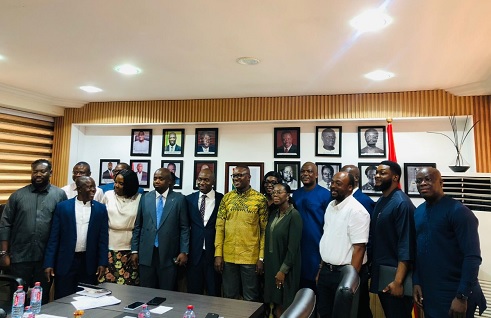The government plans to undertake major review in the petroleum downstream to conform to modern trends, John Abdulai Jinapor, the Minister of Energy and Green Transition, has announced.
The review would help define rules, inject operational efficiency, increase accountability, and ensure that the public was better served.
“My predecessor attempted reviewing some portions of the petroleum sector. It was stuck in Parliament. So, this time around we are taking a holistic view of the entire petroleum downstream … and ensure that we serve the people of Ghana,” he said.
Mr Jinapor said this on Tuesday in Accra when he held separate meetings with executives of Chamber of Oil Marketing Companies, Tanker Owners Union, Tankers Drivers Association, and Ghana Chamber of Bulk Oil Distributors.
The meeting is a follow-up to an earlier consultation prior to the 2024 elections to gather inputs to formulate the manifesto of the National Democratic Congress.
Mr Jinapor stated that a seven-member committee would be set up to engage with stakeholders and give advice on the best way forward to address the challenges in a more transparent manner.
He noted that the Government was reviewing the Gold for Oil programme, and that the Minister of Finance was working on the gold aspect and intended to set up a gold board.
Revamping of the Tema Oil Refinery was integral part of the Government’s vision, he said, adding: “If we can get local entrepreneurs to lead the process it will help us a lot. It will be in line with our local content policy.”
He urged the stakeholders to also focus their attention on opportunities in the renewable sector.
“The traditional fossil fuels would eventually be giving way to some level of renewable energy and so you must be ahead of the curve so that you can tap into that sector.”
Dr Patrick Ofori, the Chief Executive Officer of the Ghana Chamber of Bulk Oil Distributors, said the Chamber welcomed the vision to “change the face” of the Tema Oil Refinery.
He said the Chamber was committed to the government’s idea on the green transition with some of the industrial players already promoting the use of ethanol and other renewables.
The Chamber, he hinted, would host the first downstream seminar on how the sector could practicalise the 24-hour economy.
Dr Riverson Oppong, the Chief Executive Officer, Chamber of Oil Marketing Companies, said the Chamber worked with the National Petroleum Authority on a number of interventions.
These include the introduction to the price deregulation policy and formulate the legislation to curb illegal activities, such as smuggling and fuel adulteration.
The Chamber, he said, instituted the downstream safety week since 2017 to increase safety awareness in the sector.
As of 2024, it contributed more than $19 billion to taxes in the country and created almost 160,000 direct and indirect jobs.
However, the Chamber was experiencing operational, stakeholder and policy issues that needed urgent attention, Dr Oppong said.
“Sometimes there are inadequate products available in Takaradi and Kumasi, reason why, at the end of last year, we saw some fuel shortages in the middle belt…For the past one month, and even beyond, we have had constant disruption of the Integrated Customs Management System,” he said.
“And like I always say to our media friends, when petroleum prices are going up, we are operating a system where we just do a pass-through cost. Whatever cost we embed as an OMC company, we just pass it on to the retail pump price. So if all the system challenges go down, we believe price from our members’ side can be a thing that we can look at.”
GNA





